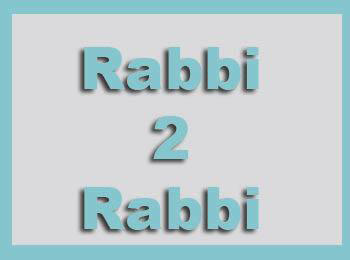In the sukkah, we’re reminded that we’re not alone, that we can find protection, and that as fragile as life seems to be, it’s what allows us to celebrate
RABBI YAEL SPLANSKY
HOLY BLOSSOM TEMPLE, TORONTO
RABBI MARK FISHMAN
CONGREGATION BETH TIKVAH, MONTREAL
Rabbi Fishman: There are many messages and much symbolism associated with the sukkah. I’m interested in focusing on the sukkah’s roof, the schach.
We are told that the schach should be made of something that once grew from the ground, that there should be more shade than sunlight, and that one should be able to see the stars when looking up though the schach.
On the surface, this all sounds so romantic, so warm and fuzzy. Yet upon closer inspection, there is something deeply fragile and vulnerable about the sukkah’s roof. Peering through so as to see the stars is another way of saying that the roof has holes in it, while the requirement for more shade than sun is akin to a building project that’s never quite finished.
Rabbi Splansky: The stars we see through the schach are the same stars Abraham set his gaze upon when God promised him countless descendants. The way you describe the holes in the roof as an incomplete building project reminds me of the custom to leave a small section of our so-called permanent homes undone, too, in order to anticipate the rebuilding of Jerusalem in the messianic era.
The sukkah also works as a vehicle for time travel. Each year with our kids, we play “Ushpizin Time Machine.” Over dinner in the sukkah we take turns travelling back in time to visit with characters from Jewish history, or someone from the Jewish future.
Rabbi Fishman: Sukkot is associated with simchah. In one of our previous exchanges, you pointed out that this word is best translated as “joy.” I think that what allows for this season to be lived so fully is the fact that the schach is so fragile.
Our houses are built of bricks and mortar, and yet we never celebrate our houses. What we celebrate instead is the Jewish home. The home is the place where we learn to share our deepest blessings with others – as the famous book title about life in the shtetl reminds us, “Life is with people.”
We don’t celebrate our buildings of stone, but rather our buildings of connection and relationship. Ultimately, this delicate roof encourages us to celebrate the bonds we create by reaching out across the divide. Perhaps this is also why the schach must allow for transference.
Rabbi Splansky: One mitzvah of Sukkot is to “dwell in sukkot,” another is to “rejoice.”
But what if the schach leaks rain into your soup and invites cold wind or mosquitoes? What if you are miserable in the sukkah? The greater mitzvah is to rejoice, so we are permitted to go indoors for our festive meal. The mitzvah challenge, however, is to find a way to rejoice despite exposure to the elements, to feel the embrace of God’s shelter.
It would be cruel to expect this of a person who is without a home, but for those who are only without a reliable roof a few days a year, it is a good lesson.
Rabbi Fishman: Kabbalistic texts call the sukkah the “shelter of faith.” The Torah teaches us to be careful at precisely this moment, as we are bidden to leave our security and enter into a realm of faith and hope. Dwelling in such a structure metaphorically draws our gaze upward, as if to say that through the thin covering of the sukkah lies our true security.
Never have we needed the message of the sukkah more. We are reminded of what grounds us and gives us the humility to make our way in this world – that we are not alone, that we can find protection, that as fragile as life seems to be, it is that very fragility which allows us to celebrate.
Rabbi Splansky: In Israel, it is common for palm branches to be used for schach. In Canada, it’s pine. In Indiana, it’s corn stalks. Meanwhile, a California vintner named Benyamin Cantz uses old vines from his vineyard.
Cantz asks, if we use the leftovers from our fields and forests for schach, what does God use for the roof of God’s sukkah? He suggests that perhaps God uses the discarded human sins left over from the Ten Days of Repentance.
Nothing goes to waste and nothing is without a purpose. The husks of our transgressions are made holy and given purpose.
